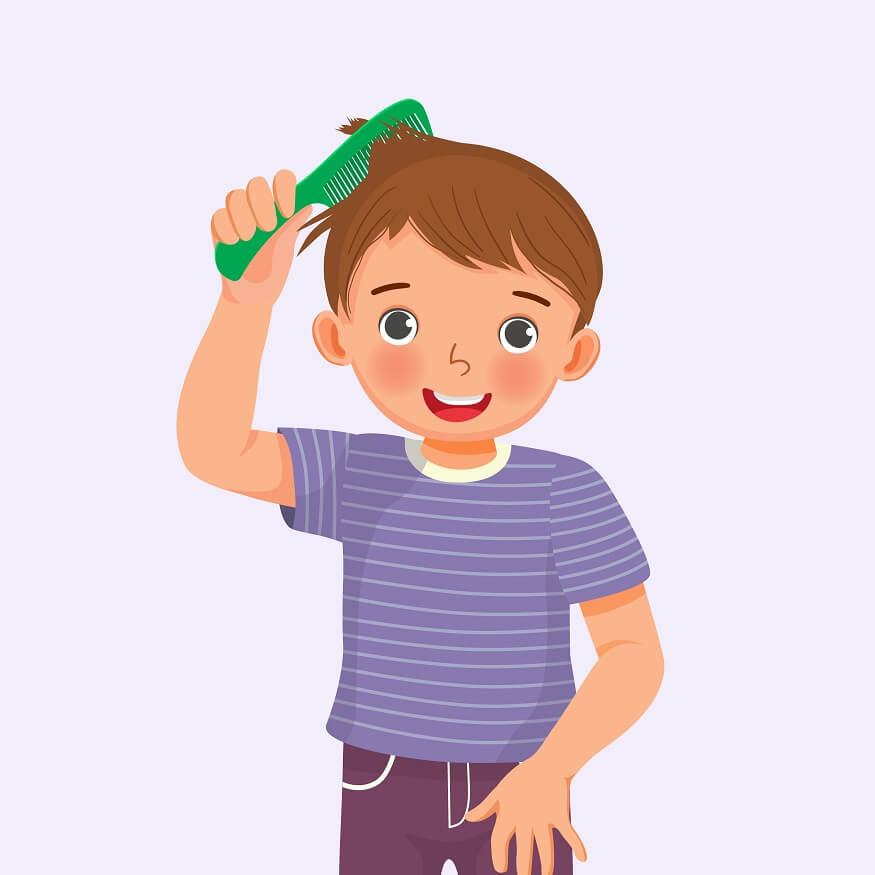Introduction
The human body regulates the growth of hair through a complex interplay of genetic predisposition, hormone fluctuations throughout life stages, and exposure to environmental triggers. While the average individual can expect to grow approximately half an inch of hair each month or six inches per year under ideal circumstances, this estimate may vary based on several factors such as age, gender identity expression disparities are common among people from different backgrounds), diet quality (balanced diets containing high-quality protein sources offer a natural means of promoting adequate follicle production), and exposure to stressors that affect immune function levels. In this article, we will read about hair and food for hair growth and nutrients for hair growth.
Hair loss vitamin deficiencies
- Vitamin D – Maintaining healthy levels of certain vitamins is crucial for preventing unwanted effects such as potential hair loss that could arise from deficiencies. This includes Vitamins D and B12 which have been specifically linked with such outcomes. Studies reveal that having insufficient amounts of Vitamin D may coincide with alopecia instances at higher rates, alongside other causes like genetics or autoimmune conditions.
- Vitamin B12 – A key factor playing an integral role in hair growth development is directly dependent on healthy follicle functioning; hence any disruption to this process can result in serious consequences if left unchecked without treatment or supplementation. Consequently, Vitamin B12 depletion likewise carries significant implications as it affects red blood cell production necessary for carrying oxygen and nutrients throughout the body including those destined for one’s scalp.
- Iron and Zinc – Hair loss can arise from various factors, including inadequate intake of nutrients like iron which plays an indispensable function in the production of haemoglobin necessary for oxygen transport by blood. Similarly important is zinc for tissue repair and promoting healthy hair growth; insufficient levels are associated with undeniably high rates of shedding.
- Vitamin E – Vitamin E also offers protection against oxidative stress on cells present on the scalp, underscoring its significance as yet another critical component required for optimal healthy hair development.
Apart from age-related and genetic reasons, multiple factors like hair loss, vitamin deficiencies, hormone imbalances, genetically predisposed tendencies, emotional turmoil and specific illnesses can cause considerable hair fall. Seeking professional advice from a medical expert is crucial for determining the primary reason behind hair loss onset and devising therapeutic measures.
Also Read: Top 9 Brain Foods for Studying
Nutrients for hair growth
- Protein – Keratin constitutes a key structural element of hair. As such proteins must be included in sufficient measures in one’s dietary intake. Protein sources like lean meats, fish, poultry, eggs, beans, and nuts can provide essential amino acids required for building up keratin molecules.
- Biotin – To foster healthy hair growth, it is crucial to incorporate biotin into one’s daily diet as this B vitamin actively facilitates the body’s production of keratin while adequately nourishing hair follicles. A rich source of biotin can be found in dietary options like nuts, eggs, entire wheat grains, and leafy green veggies. When taking additional supplementation of biotin, it is vital to seek consultation from healthcare experts beforehand.
- Iron – Haemoglobin production by the human body requires an adequate amount of Iron which serves as an important component/element for transporting Oxygen from the lungs towards different organs like Hair follicles that directly support their growth & strength maintenance. Insufficient Iron may lead towards diminished Oxygen-carrying efficiency resulting in Hair Loss problems.
- Vitamin C – The development of collagen essential for maintaining hair’s structural integrity requires adequate amounts of Vitamin C available in your diet. Eating plenty of kiwi fruit or berries along with other plant-based foods like peppers or broccoli can fulfil this requirement while also delivering additional health benefits associated with these nutritious options.
- Vitamin D – To preserve healthy hair follicles while promoting natural hair growth cycles hinges on sufficient levels of key nutrients such as vitamin D which assumes an important role in this process. Low levels might aggravate problems leading to brittle and weak tresses. Dietary sources containing high amounts of vitamin D encompass egg yolks alongside oily fish like salmon; fortified foods including cereal & milk have also shown benefits. As needed supplements could assist those facing deficiencies.
- Zinc – The significance of zinc for the development and restoration of tissues cannot be overstated; this also pertains to hair growth. Zinc provides requisite assistance in enabling the synthesis of fresh cells while contributing to the production process of keratin as well. Nutritional options such as oysters, beef, crab or plant-based sources like nuts or beans are reliable for obtaining good amounts of zinc. Zinc supplements constitute another feasible solution when facing a deficiency.
Food for hair growth
- Eggs and Salmon – When it comes to getting long and luxurious tresses, few foods can compete with the nutritional powerhouses that are eggs and salmon. Packed with biotin, vitamin D, and omega-3 fatty acids, these protein-rich options provide key nutrients needed to produce essential elements like keratin which make up healthy strands of hair. The consumption of salmon provides an excellent source of vitamin D which exerts substantial benefits on healthy hair growth by regulating head follicle cycling activities.
- Avocado – Analysis reveals avocado enriched with vitamins specifically biotin aids keratin production leading to accelerated normality during stage cycles towards a robust and glossy mane appearance making it a crucial supplement supporting vital life processes.
- Spinach – Iron-rich spinach aids a well-functioning circulatory system providing necessary nutrients like oxygen contributing significantly to fundamental functioning at the cellular level towards a healthier scalp ensuring desirable outcomes. For healthy hair growth, the human body requires a variety of nutrients supplied by the diet. Additionally, spinach yields vitamins A and C important for promoting scalp health by stimulating collagen synthesis required for proper support and maintenance of existing or new hair strands
- Sweet Potatoes – Sweet potatoes constitute another good source of beta-carotene which contribute towards the formation of vital Vitamin A while also providing copper and Vitamin C critical in reducing breakage through enhanced collagen production.
- Nuts – Rich in healthy fats, vitamins, and minerals crucial for maintaining robust hair growth, nuts are an excellent addition to one’s diet. Vitamin E present in almonds and walnuts not only facilitates improved blood circulation to the scalp but also helps produce biotin that actively promotes keratin development, leading to a fuller head of hair. Zinc present in nuts assists the human body in generating new cells and positively impacts healthy hair growth.
- Berries – Berries are rich in vitamins and antioxidants that help protect hair follicles from damage and promote healthy hair growth. They contain vitamin C, which helps produce collagen, and antioxidants, which help protect against free radical damage.
Also Read: Best Summer Drinks for Kids
Conclusion
At Euroschool, we help our students understand that a healthy diet is not just beneficial to overall well-being but also serves as an important factor for eventual hair growth. There are specific types of food for hair growth like eggs, salmon, and milk that provide zinc which supports healthy cell division that aids to promote shiny locks while spinach is rich in iron playing a significant contribution to strengthening hair follicles against breakage during styling. Other vital nutrients found in avocados such as fatty acids provide nourishment necessary for improved scalp health prohibiting the appearance of adverse reactions of dandruff formation. In conclusion, other factors like genes, diseases or overwhelming stress may trigger severe cases of alopecia thus requiring individual evaluation by practitioners with a good knowledge of dermatology fields.










